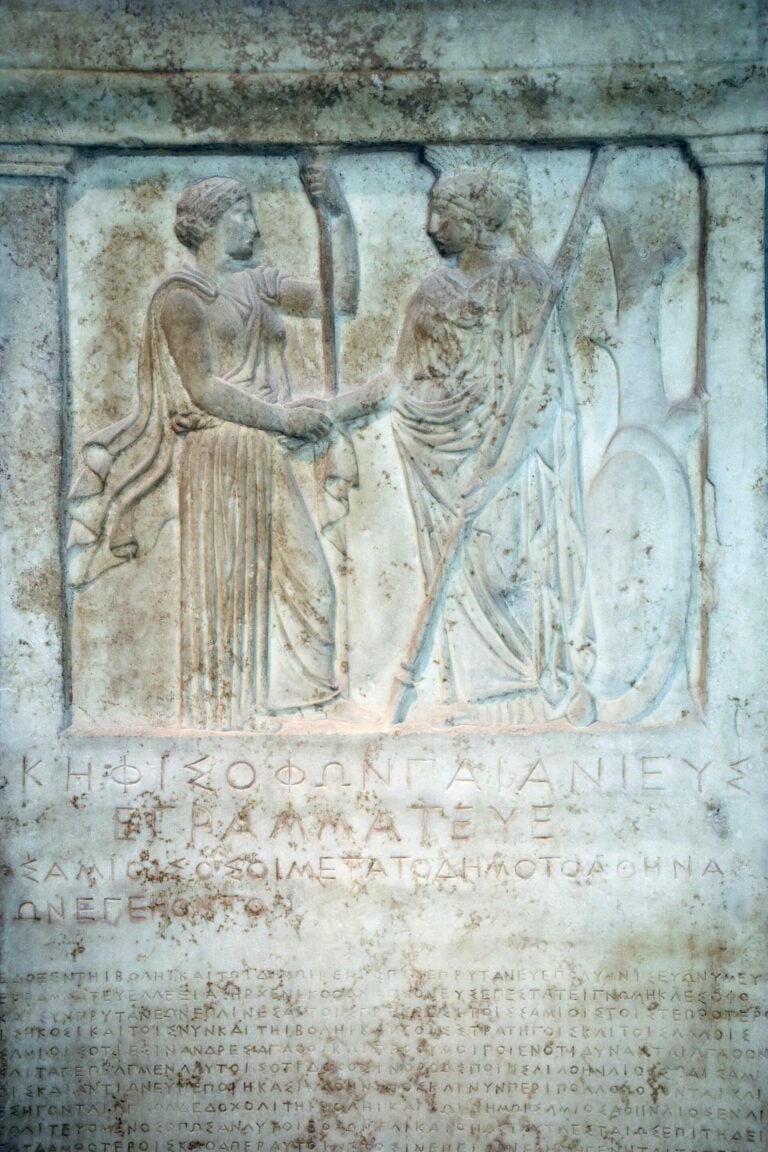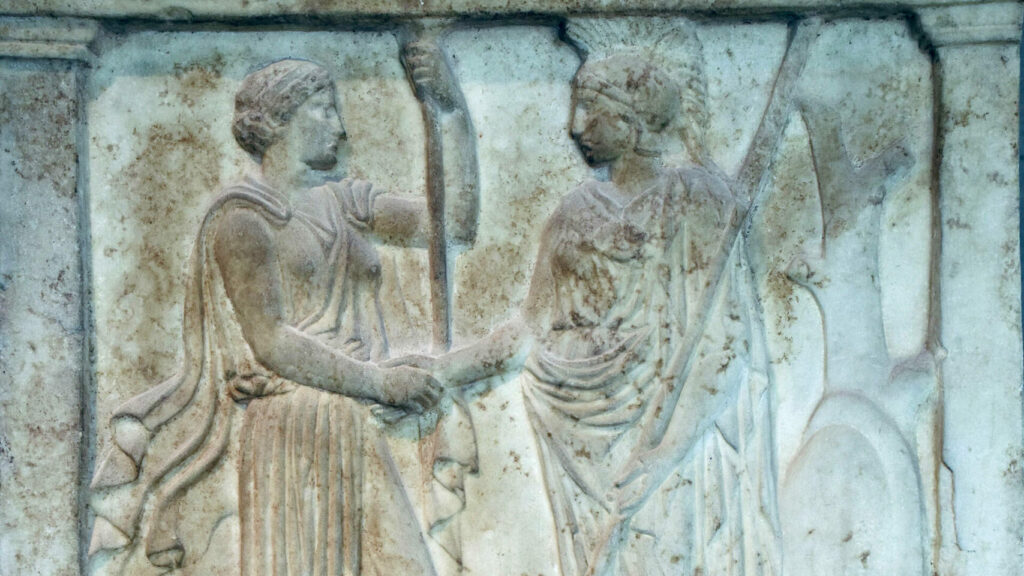“Why should my daughter learn Modern Greek?” a friend asked. She was reading an article on the subject and began to rattle off the arguments made therein, answering them herself.
“Learn Modern Greek for the career opportunities…” she read, scoffing out loud. A lawyer by trade, she began to reminisce: “What career opportunities? What it means is that you restrict yourself to the ever diminishing pool of clients within only one community.
I remember recording in my resume with pride when I was younger that I spoke Modern Greek, thinking that this would impress would be employers. I recall attending a job interview at a mid-tier Anglo law firm and instead of being asked about my legal knowledge, I was quizzed for half an hour about my knowledge of Modern Greek, only to be told that in their opinion I wouldn’t fit into the culture of the firm…”
“Maybe they are referring to careers in teaching Greek, or tour guides,” I suggested.
“Yes, what an incentive,” my friend guffawed. “Beyond the rhetoric and the advertisements in the Greek community media, the number of students who studied modern Greek at VCE Level in 2020 and 2021 are so small as to be insignificant. If this trend is not arrested, hundreds of Greek school teachers will lose their habitat and will become extinct. Bring a smile to a Greek family this February: have your teenager enrol in VCE Greek and help save lives.”
By the end of her impassioned plea, I was moved to tears and suggested that we could put Greek teachers up for adoption, like quolls or Tasmanian devils.
“Acquiring Greek along with another language results in improved memory, problem-solving and critical-thinking skills, enhanced concentration, ability to multitask, and better listening skills,” my friend read out aloud.
“Well that is a cogent argument is it not?” I ventured.
“I don’t know,” she mused. “Would you class my bilingual brother, who whispers to Alexa at home: «Alexa, με καυλώνεις κάργα,» or the majority of the aging members of our local brotherhood who recently moved a motion to sell all the brotherhood’s assets in order to charter a jet to take them on a holiday to the Gold Coast as critical thinkers?”
“Yes, but the dangers of monolingualism are manifold,” I retorted. “I point you gently in the direction of Alexis Tsipras, by way of example. By the way, how does Alexa respond when your brother utters Neohellenic sweet nothings in her virtual listening device?”
“You may call me that, but I might not understand,” she responded.
“As always, Alexa enforces the monolingualism of the dominant culture by affecting not to understand our patois,” I commented.
“Proficiency in Modern Greek unlocks the door to a civilization that has evolved from its Classical, Byzantine, and Ottoman pasts,” she read on. “So what? All the best scholarly works on Greece have been written in either English or German.”
“Tut,” I disputed. “You can’t really assert that. What about Vakalopoulos? What about Kitromilides?”
“I’ll see your Kitromilides and raise you a Mark Mazower or a Roderick Beaton,” she challenged. “What is your Vakalopoulos and his ilk who have only discovered footnotes in the last decade to their brilliance? Do you really need to speak Greek in order to gain entry into the Greek world? All the great Greek authors and poets have been translated into English. In churches all over Melbourne, increasingly the liturgy is being chanted in English. You yourself are guilty as charged, having translated Papadiamantis’ short stories into English. The Greek language is no longer a barrier to Hellenism.”
I considered this for a while as she read on: “Learning Greek can facilitate communication when on holidays in Greece.”
“Now that is indisputable,” I crowed triumphantly. “The pilgrimage to Greece is a fixture on the apodemic calendar. Surely the prospect of a sojourn in Mykonos, or Ios should prove sufficient motivation to entice one to learn the language of the Eternal Summerland.”
“Huh!” she dismissed me. “Firstly, almost all the new generations in Greece are proficient in English, much more proficient than we are in Greek, especially in the tourist traps, so speaking Greek is no barrier.

And the kind of Greek we speak marks us out as unintelligent foreigners, ripe for exploitation. Secondly, who is to say that Greek-Australians will continue to flock to the flesh-pots of Hellenic tourism as lemmings in the future? How many times can you visit the Parthenon or the same beach?
There are other places in the world to discover too, you know. We went to Montenegro last year. It was amazing. Much cheaper, more pristine and authentic than the overrated, overpriced Greek islands.”
“Firstly,” I countered, “for the Greeks of Australia, the rest of the world does not and will not ever exist as a plausible destination. This is a fact that you must accept. Secondly, I have known that I will never, ever step foot in Montenegro ever since Biljana Krasic slapped me across the face for refusing to taste her Slatko in Year 11. There is only the dream of visiting Greece one day that sustains me during my wintry Melburnian daily toil and it is only those who have never visited Porto Katsiki in Lefkada who would dare to ask how many times could one possibly visit it before tiring of life. Fie and for shame.”
“Knowledge of Greek adds depth and meaning to the life of any English speaker, considering the amount of Greek words in the English language,” she intoned.
“They have you there,” I laughed. If I had a dollar for every facebook meme I have seen maintaining that there are a million, nay, a billion Greek works in the English language…”
“So why not learn Latin, or Norman French, or Norse if the whole aim of learning Greek is to enhance one’s English?” she retorted, reading further: “Learning Greek allows for better communication and a stronger connection with loved ones.”
“An incontrovertible proposition,” I pointed out. “Don’t you want your daughter to be able to speak to yiayia and pappou in their own language?” I said this slowly so that my interlocutor would realise and appreciate the semantic difference between yiayia and ya-ya, pappou and pa-poo and was immensely gratified when she acknowledged this.
“Do you know ANY set of grandparents that speak to their grandchildren in Greek?” she asked pointedly. “Those brought up in Greece immediately switch to some sort of pidgin English so that my best friend’s son went to Greek school thinking that ντάλι, was a Greek term of endearment, a misapprehension that his Greek school teachers refrained from disabusing him of. And my parents, who came here at a young age, feel more comfortable speaking English to each other, let alone their grandchildren. It’s also complicated. My sister decided not to teach her kids Greek after her kindergarten teacher told her that this would retard their progress at school. So how will my parents speak English to them and Greek to my daughter when they are all together?”
“Maybe you could try speaking to your daughter in Greek and take it from there,” I suggested.
“Maybe I can hire a French nanny and get her to learn that instead,” she pondered. “French is such a sophisticated language.” I venture a few French phrases, only to be told: “Except when spoken by you. You sound like a West African people smuggler.” Despite my entreaties, she refused to elucidate the source of her knowledge in this regard.
“Learning Greek can lead to deeper and more meaningful friendships, and can also open up opportunities to connect with the wider Greek community,” she read and placed the article on the table before her.
“What say you of Greek being the key to comradeship and fraternal love?” I inquired.
“Garbage,” she snorted. “First of all, most of the Greek organisations such as they are conduct their affairs in English now.
Second, from what I’ve seen, even the offspring of ‘off-the-boaters’ are keen to jettison the language in their quest to fit in and achieve greater prospects. Rather than expanding one’s horizons, knowledge of Modern Greek limits them because those who don’t have capacity in the language feel intimidated by those who do and avoid their company. And first-generation Greeks are wary of latter generation Greeks who have facility in the language because this upsets the power imbalance inherent in them using the language to exclude others from positions of power.”
“Can I make a small observation without causing offence?” I asked timidly and having received an answer in the affirmative, made so bold as to observe: “Perhaps if you have to ask why your child should study Modern Greek, that is to say, if the answer is not already apparent to you, then perhaps the whole effort at rationalisation is redundant.”
“So let me ask you a question,” she riposted, blushing. “Why do you send your children to Greek school? Why do you teach them the language? Not the propaganda, not the rhetoric. And don’t give me your “Greek language as an act of resistance against Anglo-Saxon monoculturalism’ spiel. The real reason.”
I paused.
“No, don’t think about it. If you have to think about it then it’s not the real reason,” she cajoled. “Quickly, in ten seconds or less.”
“It was instinctive. I didn’t think about it. I just had to,” I confided at last, embarrassed at how stilted the words were coming out of my mouth. “I cannot consider life without the Greek language. It informs my entire existence – how I see the world, how I relate to others. I don’t think I can have as honest and close relationship with my children as I would like to unless that relationship is communicated or plays out in that language.”
She looked at me for what seemed an age and I could not tell whether she was moved or about to burst out laughing.
“I liked the Mykonos argument better,” she said finally. “Now which school should I enrol my daughter in? The one that only goes by an English name?”









